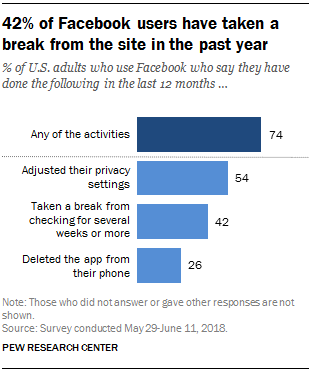Significant shares of Facebook users have taken steps in the past year to reframe their relationship with the social media platform.
 Just over half of Facebook users ages 18 and older (54%) say they have adjusted their privacy settings in the past 12 months, according to a new Pew Research Center survey. Around four-in-ten (42%) say they have taken a break from checking the platform for a period of several weeks or more, while around a quarter (26%) say they have deleted the Facebook app from their cellphone. All told, some 74% of Facebook users say they have taken at least one of these three actions in the past year.
Just over half of Facebook users ages 18 and older (54%) say they have adjusted their privacy settings in the past 12 months, according to a new Pew Research Center survey. Around four-in-ten (42%) say they have taken a break from checking the platform for a period of several weeks or more, while around a quarter (26%) say they have deleted the Facebook app from their cellphone. All told, some 74% of Facebook users say they have taken at least one of these three actions in the past year.
The findings come from a survey of U.S. adults conducted May 29-June 11, following revelations that the former consulting firm Cambridge Analytica had collected data on tens of millions of Facebook users without their knowledge.
Related: Many Facebook users don’t understand how the site’s news feed works
Facebook has separately faced scrutiny from conservative lawmakers and pundits over allegations that it suppresses conservative voices. The Center found that the vast majority of Republicans think that social platforms in general censor political speech they find objectionable. Despite these concerns, the poll found that nearly identical shares of Democrats and Republicans (including political independents who lean toward either party) use Facebook. Republicans are no more likely than Democrats to have taken a break from Facebook or deleted the app from their phone in the past year.
 There are, however, age differences in the share of Facebook users who have recently taken some of these actions. Most notably, 44% of younger users (those ages 18 to 29) say they have deleted the Facebook app from their phone in the past year, nearly four times the share of users ages 65 and older (12%) who have done so. Similarly, older users are much less likely to say they have adjusted their Facebook privacy settings in the past 12 months: Only a third of Facebook users 65 and older have done this, compared with 64% of younger users. In earlier research, Pew Research Center has found that a larger share of younger than older adults use Facebook. Still, similar shares of older and younger users have taken a break from Facebook for a period of several weeks or more.
There are, however, age differences in the share of Facebook users who have recently taken some of these actions. Most notably, 44% of younger users (those ages 18 to 29) say they have deleted the Facebook app from their phone in the past year, nearly four times the share of users ages 65 and older (12%) who have done so. Similarly, older users are much less likely to say they have adjusted their Facebook privacy settings in the past 12 months: Only a third of Facebook users 65 and older have done this, compared with 64% of younger users. In earlier research, Pew Research Center has found that a larger share of younger than older adults use Facebook. Still, similar shares of older and younger users have taken a break from Facebook for a period of several weeks or more.
In the wake of the revelations about Cambridge Analytica, Facebook updated its privacy settings to make it easier for users to download the data the site had collected about them. The new survey finds that around one-in-ten Facebook users (9%) have downloaded the personal data about them available on Facebook. But despite their relatively small size as a share of the Facebook population, these users are highly privacy-conscious. Roughly half of the users who have downloaded their personal data from Facebook (47%) have deleted the app from their cellphone, while 79% have elected to adjust their privacy settings.
Note: See full topline results and methodology here (PDF).



